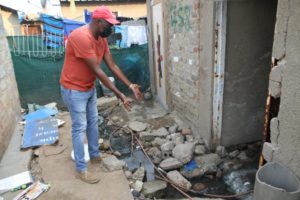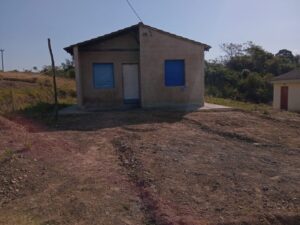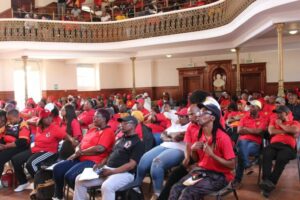
Long snaking queues have become a common sight at the Cape Peninsula University of Technology as hundreds of students brave the scorching sun hoping that they will get a place in the university’s residences.
At night, the students sleep in TV rooms, the student centre and the SRC offices. On Monday, the university called on the riot police to repress a protest by the students. The police used stun grenades and arrested some of the protesting students.
Ayabulela Mbiza, deputy president of the CPUT Student Representative Council told Elitsha that some students are still nursing injuries from being attacked by the police. “They charge us with assault, but I never saw any student attack the police. We were marching just to get public sympathy,” said Mbiza.
Desperate for accommodation
The students who come from various provinces have been flocking for weeks to the student centre to check the status of their applications for accommodations. Lithemba Ndongeni, who hails from King Williams Town in the Eastern Cape, said she has been trying for the past three weeks to find out if her application for accommodation has been approved. “I have been standing in the queue for the past three weeks. I desperately need accommodation because I don’t stay here,’’ she said. She is currently staying at a relative’s place in Harare, Khayelitsha. “I was expected to stay with her for a short period as she doesn’t have means to support me,” she said.
‘I can’t attend classes’
Ndongeni, a chemical engineering student, said she spends over R100 to travel to CPUT to check if her application for accommodation has been accepted. She is falling behind with her academic work. “Other students are already receiving tuition, but I can’t attend classes because I’m still busy sorting out accommodation,” she said.
Sanelisiwe Getyeza, who comes from Mzimkhulu in Kwazulu-Natal, said she has been trying to find out if she will get accommodation since Friday. “Officials keep on saying my application is still pending,” she said. Meanwhile, she has been sleeping on the floor at the student centre. “When I wake up in the morning, my body aches from sleeping on the floor,” she complained. She has not washed properly since she arrived at CPUT.
Ntlakanipho Maphalala, a member of EFF student command, said: “CPUT gives accommodation to students who obtained 60 percent in their exams. Seventy percent of those students who are standing in the queue for accommodation meet the 60 percent criteria, otherwise they would not queue up if they knew they don’t meet it,” he said.
Maphalala said CPUT increased its admission target from 36,000 to 38,000 this year. “CPUT increased its admission target by 2,000 but secured only 900 additional beds. Now hundreds of students sleep outside,’’ he said.

CPUT abandons students
Ayabulela Mbiza, deputy president of CPUT Student Representative Council, said the university has told the students to stay off-campus but this is not possible without serious challenges. He said the cash-strapped students are battling to buy three meals a day. “Now they are running out of money to buy food. They can’t live on takeaways because food is expensive. Some of the students sleeping outside are on their periods, but they don’t even have toiletries,’’ Mbiza said.
‘The residences are full’
The SRC identified a place in Salt River that can accommodate 75 percent of the students sleeping outside, he said. “The place can house 250 students. It’s up to standard. The manager says he needs a consent from the university before he can accommodate the students, but CPUT refuses to give the consent.”
Laurane Kansley, spokesperson for CPUT, said the university was able to place 1,000 students in residence since the weekend. The university cannot accommodate the hundreds of new applicants arriving on campus everyday in the hope of being placed, she said. “We have now placed notices across campuses indicating that residences are full to capacity. Applicants need to approach private accommodation and landlords now.”





